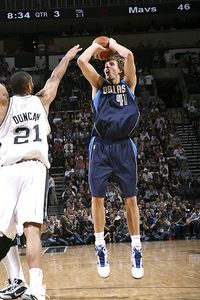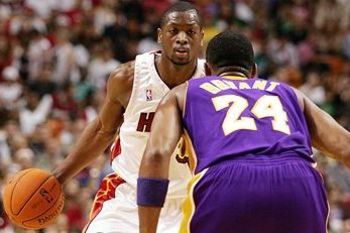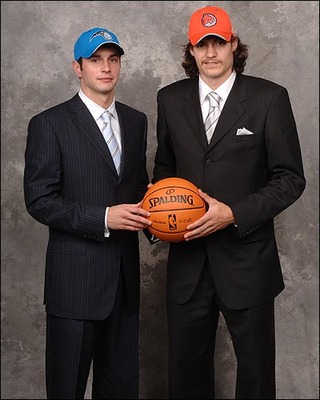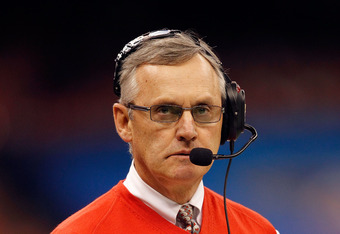On Pardon the Interruption (PTI) yesterday, Kobe was on ‘Five Good Minutes,’ something I admittedly only pay attention to when an NBA representative is on it. He was relaxed the whole time, and was completely unfazed by any questions that Wilbon and Kornheiser threw at him. Everyone who knows me is completely aware of how often I criticize the guy for his general off-court demeanor, but I have to admit that his interviewing skills are superior to that of some of his All-Star peers (cough cough, LeBron). No matter what turmoil the Lakers have gone through this year, he’s been cool, calm, and collected all season. He, more than any of the other Lakers, never panicked during their early regular season struggles, and they have only lost ONCE since the All-Star break (16-1).
With the Spurs struggling with injuries to their Big 3, they may very well basically run the table the rest of the regular season and sit atop the Western Conference. Kobe and Gasol have been elite players all year long, but the difference lately has been the contributions of the supporting cast. Even much-maligned Ron Artest has been playing his best basketball all season, particularly in the last 3-4 weeks. Andrew Bynum, while not fully healthy, has been on a tear on the glass. Few have been rebounding the ball as well as him of late; only Dwight Howard, Kevin Love, and Kris Humphries (shameless plug on my part, but the best fantasy waiver wire pick-up of the year!) have averaged more rebounds than him in the last 30 games. That’s just their starting five. Adding to the mix is Lamar Odom, who I still think should win the Sixth Man award this year. With so many weapons, it’s hard to dispute the Lakers’ likelihood for a three-peat.
 |
| Nobody looks better heading into April than Kobe and the Lakers |
So who can beat them? Here are the top 5 teams that are best suited to face L.A. Note that this is not necessarily my list of the top 5 teams of the NBA (behind LA), although this closely resembles that.
5 – Chicago Bulls
 |
| Rose would have to be beyond outstanding to beat LA |
No one can deny the quality of this team and its outstanding run to the top of the East standings. Somehow, they are still somewhat under the radar; most are still picking Miami or Boston to win the East when all is said and done. I hate to sell them short by seconding that thought, but I really don’t think the Bulls are seasoned enough to take down the veteran teams of the league – including LA. Do they match up well with the Lakers? Yes and no. Rose and Noah will obviously give the Lakers trouble, but ultimately the Lakers will exploit weaknesses of their teammates in a 7-game series. Boozer isn’t exactly an elite defender, and he will struggle mightily against Pau Gasol (just as he always has in a Jazz uniform). Eventually in a series, LA would clamp down on D-Rose and force the other Bulls to score. I just don’t see enough offensive firepower on Chicago – with no scoring wingmen to complement Rose and little chance that Boozer and Noah will consistently produce against the Lakers’ front line – to punish that defensive strategy. Ultimately, Rose would have to average 40+ points and 15+ assists for this year’s team to win a series against the Lakers.
I don’t think this is their year to beat LA. In addition their inexperience in later playoff rounds, their weaknesses may be too hard to overcome. But as they continue to grow and add more pieces, their chances to win next year and beyond will be a different story.
4 – Boston Celtics
 |
| The Celtics still look distraught without Nate around to cheer them up |
Two words describe why the Celtics are this low on the list: Kendrick Perkins. I’ve said repeatedly that this trade was, in my mind, the death of the Celtics “dynasty.” I can’t trust today’s Shaq to stay healthy, much less to bang bodies with Bynum and Gasol (what has he played, like 10 games all season?). The Perkins/Robinson trade has scarred the Celtics both from a basketball and camaraderie standpoint, and I really don’t have a good feeling about them heading into the playoffs. Don’t forget that Nate Robinson changed the dynamics of last year’s playoff run as well, and their current backup point guards (Delonte West, Carlos Arroyo) will be asked to fill his shoes. I don’t think they are nearly as effective of backups to Rajon Rondo as Nate was, not to mention that Nate was a great presence with his positive attitude both on the court, the sidelines, and in the locker room. Can’t really count on Delonte to be very positive and encouraging.
Still, the Big 4 is still there. If the team stops being so sour over the loss of Perk, they can get their act together and still be a very tough out in the playoffs. If both O’Neals get healthy by then, that could offset the loss of Perkins and they might have enough depth on their front line to be able to help contain Bynum and Gasol. Coach Doc Rivers has generally drawn up some decent defensive schemes against Kobe (remember Kobe’s miserable 6-24 shooting in Game 7 last year?), and has the personnel to make it tough for him with several solid perimeter defenders on the wing. Then there’s Kevin Garnett, who of course is the anchor to their suffocating defense.
In the end, I just can’t help but think the loss of Perkins will hurt them. They were clearly at a level higher than the rest of the Eastern Conference, but now the playing field has been leveled. Of course, their loss is another team’s gain…
3 – Oklahoma City Thunder
 |
| KD and Westbrook will do their thing, but they need help from everyone else to beat the Lakers |
Visualizing an OKC-LA matchup immediately brings last year’s intense first round matchup between the two teams to mind. Other than Boston, the young and athletic Thunder team was LA’s toughest opponent last year. This year, it’s easy to see Kevin Durant or Russell Westbrook dominating their respective matchups in another series, as they’ve only gotten better since last year (especially Westbrook, who absolutely lit up the Lakers a year ago). But their supporting cast and size will also be a formidable match for that of LA’s. In Perkins, they gained the toughness and interior defense that Boston will sorely miss. In the limited number of games he’s played for OKC thus far, he and Serge Ibaka have been dominant on the glass. As Perk gets more comfortable, their frontcourt will be tough to score on. In the backcourt, Thabo Sefolosha is a vastly underrated perimeter defender and will seldom need any help guarding Kobe. James Harden has been a solid sixth man for the team as well. Harden took on a bigger scoring load for the team after Jeff Green’s departure, averaging about 17 points per game on nearly 50% shooting – being just as efficient with increased minutes.
For most of this season, the Thunder regressed noticeably on the defensive end; they rank 13th in Hollinger’s Defensive Efficiency rankings this season, and consider that this rating has been somewhat inflated since trading for Perkins. They were only 8th last year, but really peaked in defensive cohesion toward the end of the season and into the playoffs.
While they have all the tools to beat LA, I just haven’t seen the consistency and growth in them this year to de-throne the Lakers. While their defense has picked back up since trading for Perkins, it’s still not at the level it was last year. It will take some time for the new acquisitions to get adjusted to Scott Brooks’ system. Generally, it takes a while for a team to gel after a big trade. Much like the case with Chicago, I just don’t think the young Thunder are seasoned enough as a team to beat the champs quite yet.
2 – Dallas Mavericks
I know, I know. You’re thinking, “No #@#$ing way these historically underachieving Mavs can beat LA!” Everyone knows about their ongoing struggles in the playoffs, losing to San Antonio. The last thing Mavs fans need are reminders of their playoff disappointments. Here’s a summary of them, anyway. I tried categorized them by the quality of their playoff runs: green for a solid year, red for a terribly disappointing showing, and orange for a so-so one.
 |
| When flying under the radar, the Mavs can play well against the league's top teams. |
Regarding the mental fragility of the Mavs, they have clearly been labeled the team that can’t get over the hump regardless of their regular season success. But they seem to do worse when they’re the favorites. Their run to the NBA Finals in 2006 started when most thought of them as a middle-of-the-pack team. They don’t respond as well when the pressure is on them to win; they were heavy favorites to beat Miami in the Finals. The following season, they dominated the NBA and won 67 games. They were a title favorite heading into their matchup with the 8th seeded Golden State Warriors, then, well… you know the rest. Point is, they play better when the pressure is off. In the years they were one of the lower seeds (6-8), they tend to struggle. But those seasons were more so a result of mediocre or injury-depleted rosters. But as an underdog yet quality contender? I like their chances. Overshadowed by the loss to Miami that year is their impressive and hard-fought victory over the Spurs in 7 games, when their chances against the favored San Antonio team was outright dismissed at the time. If the Mavs have the talent to contend (they do), they will play far better as a team under the radar as opposed to a team favored to win.
Now that I broke down some of the intangibles and the Mavs psyche heading into the postseason, let’s look at this matchup from a basketball perspective. The one difference between this Mavs squad and those of previous years is their size. Between Tyson Chandler and Brendan Haywood, this team has the size and interior toughness to muscle around with the Laker bigs. No one remembers this, but Dirk actually matches up very well against Pau Gasol (go back to the 2006 1st round matchup when Dirk’s Mavs swept Gasol’s Memphis Grizzlies, who were no slouches by any means). Seemingly every year, they are a deep team with multiple scorers coming off the bench. This year’s team is no exception – Jason Terry is playing well as he’s ever been, and is the favorite for this year’s Sixth Man award. He’s also very clutch, always among the top 10 in the league in terms of 4th quarter scoring. If Caron Butler is able to come back from his regular season-ending knee injury, this team has the size, depth, and scoring ability best suited to take down LA. Every playoff series come down to matchups, and I think Dallas matches up very well with the Lakers. We just haven’t been able to truly witness that yet.
 |
| Even when Dallas is favored, Mavs fans can't exhale |
Having said all that, beyond being basically tailor-made to beat the Lakers, I still can’t see them going all the way to win the title. Even if they get by LA in a notional 2nd round matchup, there’s no guarantee they would overcome their history of playoff collapses in order to go on and win the championship. That has to be disheartening for Mavs fans, as Dallas is the one great team that you can never bank on to win a playoff matchup against a quality team, against both superior and inferior opponents. For the sake of Mark Cuban, Dirk and the players, and the Mavs’ fan base, I’m pulling for Dallas to finally have a breakthrough playoff year. As far as I’m concerned, it’s now or never; their core of Kidd, Nowitzki, Chandler, Marion and Terry is not getting any younger.
We get to see a preview of these two teams on TNT Thursday night, but I would take the result of that game with a big grain of salt. The Mavs will be the first to tell you that the playoff atmosphere is completely different from that of the regular season. But what separates them from the teams below them on this list is their combination of scoring, size, depth, and veteran experience. But even that might not be enough to shed their playoff curse. Their annual playoff disappointments, by the way, are the only reason why I’m putting them behind the team who I think is best-suited to beat LA…
1 – Miami Heat
As mentioned earlier, playoffs come down to matchups. On top of their losses in both matchups with Miami this season, they seem to have struggled with LeBron-led teams the past few seasons; LeBron’s Cleveland team had their number last year as well. Ron Artest may be the one of the most frustrating players to play against in the NBA, but not for a guy who’s just as big and strong as he is. Nobody has had more success against the Lakers than LeBron, who has dominated the Lakers as much as anyone with his all-around play. Look at his last four games vs. LA:
 |
| If Kobe has trouble guarding D-Wade, Miami should give the Lakers fits |
Then there’s the always-intriguing Kobe-Wade matchup. I’ve always argued that Wade may be the best Kobe-defender in the league, and the Heat’s last two games vs. LA reflected this. At this phase of their careers, Wade seems to be a step ahead of Kobe on both ends of the court. This was particularly evident in their last matchup earlier this month, with Wade making clutch plays both on defense when guarding Kobe and offensively while being guarded by him. If LBJ and Chris Bosh continue to produce at a very high level (as they have been lately) and the sharp shooters (Mike Bibby, James Jones, and Mike Miller) are on, Wade won’t need to conserve energy on the defensive end in order to carry the scoring load.
Obviously it will take more than just LeBron and D-Wade to beat a stacked Laker team. With Bosh finding his groove with the team, the even the Lakers will find them very, very tough to guard. Furthermore, if they impose their will and speed up the tempo of the game, they can definitely give the Lakers fits – especially if they create easy transition plays with their defense like they did in their regular season matchups. They are going to need to be a scrappy team to overcome LA's size advantage. Overall, if LeBron displays his usual dominance vs. the Lakers and defers to Wade as the closer, I think Miami has the best chance to take down the two-time defending champs.
This is not to say they are favorites to win the title – of course they need to get through the East first. Will that happen? I’m not so sure yet. I’ll get back to that later as the playoffs get closer.
So, back to the question at hand: can anyone beat LA in a 7-game series? Yes. Will they? We will see..





















